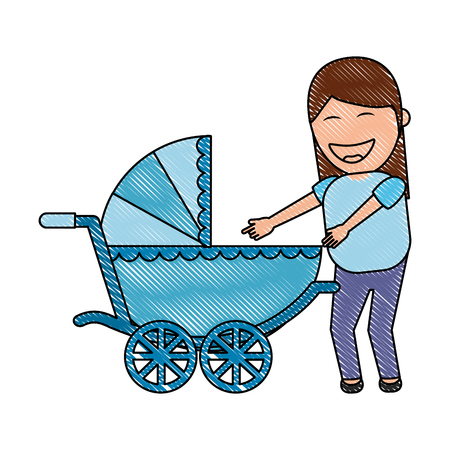1. Understanding Indian Family Dynamics
When it comes to time management for Indian families, especially regarding tasks like diaper changing and cloth washing, understanding the family structure is crucial. India’s rich cultural diversity means families commonly exist in either joint or nuclear setups, each influencing daily routines and parenting responsibilities differently. In a joint family, multiple generations live under one roof, often sharing household duties such as baby care and laundry. Grandparents, aunts, and uncles may assist with diaper changes or take turns with washing clothes, allowing parents to distribute their workload and save precious time. On the other hand, nuclear families—typically comprising just parents and children—require parents to manage all chores themselves. This can make efficient time management even more essential. Recognising these differences helps Indian families identify practical strategies that respect traditional values while adapting to modern life’s demands, ensuring everyone contributes effectively to daily childcare and home upkeep.
Prioritising Time with Traditional and Modern Methods
In many Indian households, time management is deeply influenced by a blend of age-old traditions and the adoption of new technologies. When it comes to diaper changing and cloth washing, families often find themselves balancing traditional family habits—such as using homemade cloth nappies—with the convenience of modern disposable diapers and washing machines. Each approach offers unique benefits and challenges, especially when considering health, hygiene, environmental impact, and time constraints.
Understanding Family Preferences
Some families prefer sticking to traditional cloth nappies (langots), valued for their reusability, cost-effectiveness, and alignment with eco-friendly practices. Others lean towards disposables for their convenience, especially in urban settings where both parents may be working. Understanding these preferences can help families prioritise tasks effectively, ensuring both baby’s comfort and efficient household routines.
Comparison Table: Traditional vs Modern Methods
| Aspect | Traditional Cloth Nappies | Disposable Diapers |
|---|---|---|
| Time Spent on Washing | High (manual soaking & washing) | Low (mostly disposal) |
| Cost Over Time | Low (reusable, one-time investment) | High (recurring purchase) |
| Environmental Impact | Eco-friendly | Less eco-friendly (waste generation) |
| Cultural Acceptance | Widely accepted, especially in rural areas | Increasingly common in cities |
| Convenience Level | Requires more effort & planning | Saves time but adds to household waste |
Tuning Family Routines for Efficiency
To make the most of available time, Indian families can consider integrating both methods based on daily schedules. For example, using cloth nappies during daytime when handwashing is manageable, and switching to disposables at night or during outings. Combining traditional wisdom—like sun-drying nappies for natural disinfection—with contemporary tools such as washing machines allows for both efficiency and adherence to cultural practices.
By evaluating priorities and adopting a flexible approach, Indian families can create balanced routines that honour tradition while embracing the advantages of modern innovations. This strategy ensures better time management around essential tasks like diaper changing and laundry, supporting overall family well-being.

3. Cultural Norms and Community Support
In Indian families, managing daily routines like diaper changing and cloth washing is not just a parent’s responsibility—it is often a collective effort shaped by deep-rooted cultural norms. Traditionally, the extended family structure, including grandparents, aunts, and uncles, plays a pivotal role in supporting young parents. Neighbourhood aunties and trusted domestic helpers—commonly referred to as “bai” or “didi”—are invaluable when it comes to sharing household chores. Their involvement not only lightens the workload but also fosters a sense of community and belonging.
These support networks are particularly beneficial for working parents who struggle to balance professional duties with childcare and household tasks. The willingness of relatives and neighbours to lend a helping hand makes time management more achievable for Indian families. Whether it’s an aunty dropping by to help with washing nappies or a didi expertly managing laundry, these contributions allow parents to focus on other essential responsibilities without feeling overwhelmed.
By embracing this spirit of collaboration and leveraging available community resources, families can develop practical routines that save time and reduce stress. Encouraging open communication within these networks ensures everyone understands their roles, making daily chores like diaper changing and cloth washing smoother and more efficient.
4. Efficient Diaper Changing Routines
For Indian families juggling multiple responsibilities, streamlining the diaper changing process can save precious time and reduce daily stress. By setting up dedicated changing spots, keeping all essentials within arm’s reach, and engaging family members, you can make diaper changes smoother and more hygienic.
Organising the Diaper Changing Area
Select a safe, easily accessible spot in your home—such as a corner of the bedroom or near the bathroom. Lay down a washable mat (often called a “chatai” in many Indian households) that is easy to clean after each use. For those living in joint families or smaller spaces, consider portable diaper caddies that can be moved from room to room.
Keeping Essentials Handy
Maintain a well-organised basket or tray stocked with diapers, wet wipes (or cotton balls and warm water for sensitive skin), rash creams like coconut oil, and a change of clothes. Use small labelled containers or pouches to keep items separate and avoid confusion during hurried moments. Here’s a simple table for quick reference:
| Essential | Local Alternative/Tip |
|---|---|
| Diapers | Cloth nappies (langots) or disposable diapers |
| Wipes | Cotton & warm water (gentler for baby skin) |
| Cream/Oil | Coconut oil or traditional Ayurvedic balms |
| Mat/Sheet | Chatai/plastic mat for easy cleaning |
| Spare Clothes | Kurtas/onesies kept nearby in a pouch |
Involving Family Members: A Collective Approach
In Indian culture, caregiving is often a shared responsibility among parents, grandparents, and sometimes older siblings. Assign small tasks: one person can hand over items while another distracts or soothes the baby with a lullaby (“lori”) or gentle talk. Grandparents can prepare herbal solutions or help wash cloth nappies, while older kids can fetch fresh clothes or dispose of used diapers hygienically. This not only builds family bonds but also ensures no one person feels overwhelmed.
5. Smart Cloth Washing Strategies
For Indian families, efficient and hygienic washing of cloth nappies and baby clothes is essential to save time and ensure your baby’s health. Leveraging locally available resources can streamline the process without compromising cleanliness. Below are practical strategies tailored for Indian households:
Quick Pre-Rinse with Washing Stones
Washing stones, or dhobi patthar, are found in many Indian homes and can be used for a quick pre-rinse. Immediately after changing, rinse soiled nappies under running water and use the stone to gently scrub away residues. This reduces stains and odours before the main wash.
Choosing Traditional Soaps for Hygiene
Traditional soaps like Rin, Nirma, or natural options such as Multani mitti (Fuller’s earth) can be effective for removing tough stains and killing germs. Rub a small amount of soap onto the damp cloth, focusing on heavily soiled areas, and let it sit for 5–10 minutes before rinsing.
Efficient Machine Washing Techniques
If you have access to an automatic washing machine, collect all used baby clothes in a designated bucket throughout the day. Wash them together at night using a gentle cycle with baby-safe detergent. Adding a cup of white vinegar or lemon juice during the rinse cycle acts as a natural disinfectant and keeps fabrics soft.
Sun Drying for Extra Protection
After washing, always dry nappies and baby clothes under direct sunlight whenever possible. The sun’s UV rays act as a natural sanitizer, reducing bacteria and helping to remove lingering odours—a time-tested method trusted by generations of Indian families.
By integrating these smart washing strategies into your routine, you not only save time but also ensure that your baby’s clothing remains clean, hygienic, and safe—all while making good use of traditional Indian resources.
6. Integrating Time-saving Habits into Daily Life
For Indian families, daily routines are often guided by a blend of cultural traditions and practical responsibilities. The morning hours can be especially hectic, balancing diaper changes, cloth washing, prayer time, and meal preparations. To streamline these busy periods, it’s important to consciously build time-saving habits into your family’s routine.
Start with Structured Mornings
Begin your day with a clear plan. Assign specific roles to each family member—whether its Nana warming milk, Papa preparing tiffin, or Dadi overseeing the first diaper change. This sense of shared responsibility not only saves time but also strengthens family bonds.
Synchronise Diaper Changing and Cloth Washing
Consider integrating diaper changing times with cloth washing cycles. For example, after the morning pooja, collect all soiled nappies and clothes and start the first load of laundry. Using a designated laundry basket for baby items in the bathroom can make this process seamless and reduce clutter around the house.
Respect Prayer and Meal Times
Traditional Indian households often observe prayer rituals (puja) before breakfast or lunch preparations. By aligning cleaning tasks either just before or after these spiritual moments, you can maintain both hygiene and devotion without feeling rushed. Set reminders on your mobile phone or kitchen clock to help keep everyone on track.
Batch Tasks for Efficiency
Try batching similar chores together—for instance, while waiting for the dal to boil or chapatis to puff up, quickly rinse baby clothes or wipe down changing mats. Involving older siblings in simple tasks like folding washed nappies or laying out fresh ones can foster teamwork and teach valuable life skills.
Create a Flexible Routine
No two days are alike in an Indian home—festivals, guests, and unexpected errands are part of daily life. Build flexibility into your schedule by keeping buffer slots between major activities. This way, even if a chore takes longer than expected, essential routines like feeding and prayers won’t be compromised.
By weaving these mindful habits into your daily rhythm, managing diaper changes and cloth washing alongside other household duties becomes less stressful and more harmonious—making space for both efficiency and cherished family traditions.
7. Encouraging Open Communication for Family Well-being
One of the most valuable time management tips for Indian families, especially when it comes to diaper changing and cloth washing, is fostering open communication among all family members. In a typical Indian household, duties are often shared between grandparents, parents, and sometimes even older siblings or domestic help. By regularly discussing each person’s responsibilities, families can create a more supportive environment that ensures both the babys needs and the caregivers’ well-being are met.
The Importance of Regular Dialogue
Open dialogue helps to clarify expectations and identify challenges in daily routines. For example, if one member finds it difficult to manage washing cloth nappies due to work commitments, another family member might step in on certain days. This flexibility prevents burnout and ensures that tasks like diaper changing and washing are handled efficiently.
Promoting Healthful Practices Through Shared Insights
When families talk openly, they can share tips on maintaining hygiene—like using traditional neem water for soaking soiled clothes or sun-drying nappies to prevent infections. These discussions encourage the use of healthful practices rooted in Indian culture while saving time by adopting proven methods passed down from elders.
Supporting Emotional Well-Being
Open communication also provides emotional support. Parenting can be overwhelming, but knowing that responsibilities are shared and concerns are heard makes the journey less stressful for everyone involved. It fosters a sense of teamwork that benefits both baby and caregivers.
In conclusion, creating a culture of open communication empowers Indian families to adapt, share responsibility, and promote healthy habits—all of which are essential for effective time management in diaper changing and cloth washing routines.


